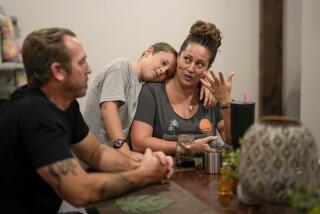Grandpa Goldwater
- Share via
It is one of the most famous political ads of all time. A little girl innocently plucks petals off a daisy. An ominous male voice begins a countdown to what turns out to be a nuclear explosion. As the mushroom cloud rises, U.S. President Lyndon Johnson intones, “These are the stakes, to make a world in which all of God’s children can live or go into the dark. We must either love each other, or we must die.”
When this ad, attacking the extremism of Republican presidential nominee Barry Goldwater ran during the 1964 presidential campaign, another little girl was riding in the caboose of the Goldwater campaign train. In television footage, this 5-year-old -- Goldwater’s granddaughter CC -- can be seen climbing on the railing along with two of her siblings, the senator’s big hand firmly ensconced on her shoulder, keeping her anchored to the train.
For the record:
12:00 a.m. June 28, 2006 For The Record
Los Angeles Times Wednesday June 28, 2006 Home Edition Main News Part A Page 2 National Desk 1 inches; 39 words Type of Material: Correction
Barry Goldwater: An item in the Tuesday Briefing column in Section A referred to the late Sen. Barry Goldwater (R.-Ariz.) as an opponent of abortion. As the Calendar story the item referred to made clear, he supported abortion rights.
The moppet is doing her job, which was simply “to go out there and be cute” recalls CC Goldwater, now 46. “To me, it was fun. Getting to ride in trains and private jets. We had big, good-looking guys with [earpieces] hanging out of their ears walking around with us, taking us anywhere we wanted. We could have as much candy as we wanted to.”
More than 40 years later, CC Goldwater has produced the documentary “Mr. Conservative: Goldwater on Goldwater,” an unabashedly admiring -- though not wide-eyed -- attempt to reclaim her grandfather’s legacy, and to reconcile the man she adored -- the avid gadgeteer, ham-radio operator, aviator, and truly talented photographer of American Indians -- with the controversial political figure, often heralded as the father of the American conservative movement.
The film plays at the L.A. Film Festival on Friday and Sunday, and will air on HBO in September. It is stocked with interviews from across the political spectrum: George Will; former Supreme Court Justice Sandra Day O’Connor, a Goldwater protege; Sen. John McCain (R-Ariz.); Sen. Hillary Rodham Clinton (D-N.Y.), a cowboy hat-wearing Goldwater Girl in her youth; Al Franken; and James Carville, as well as myriad members of the extended Goldwater family, the senator’s brother, and his children.
The longtime senator from Arizona, who died in 1998, also has the distinction of losing the White House in the biggest landslide in American history, carrying only six states, or 36% of the popular vote. His famous rallying cry at the 1964 Republican convention -- “Extremism in the defense of liberty is no vice and ... moderation in the pursuit of justice is no virtue” -- played to the Johnson political machine, which painted him as a demagogic, racist kook, who’d even consider dropping a little nuke on Vietnam.
“There were so many people who didn’t understand the person,” says CC Goldwater, a warm and vivacious former Arizona P.R. woman-turned-filmmaker, now ensconced in a hotel bar overlooking the snaking 405 Freeway. “People stereotyped him into this warmonger, someone who was trigger-happy, who was going to push the button and blow up the world, this caustic, shoot-from-the-hip guy. I don’t think anybody knew the more sensitive side of him. That’s what I wanted to illustrate in this film, the human side of Barry Goldwater.”
Goldwater might have lost the battle, but as many pundits have pointed out, his conservative, libertarian philosophy was vindicated -- at least electorally -- with the election of Ronald Reagan in 1980, who’s seen in “Mr. Conservative” in his charismatic youth, making a stunningly persuasive pitch on behalf of the Goldwater candidacy.
An ardent Westerner with a face as blunt and craggy as the state he represented, Goldwater, the grandson of a Polish Jewish immigrant, believed in less government and a strong military.
During the Cold War, he was a hawk’s hawk, possessing a deep and abiding distrust of the Soviet Union. He also was a stickler for the Constitution, and how he interpreted it. Although he banned racial discrimination in his family’s department stores, and worked toward a similar ban for Arizona schools and the National Guard, he voted against the Civil Rights Act of 1964 because he believed it was unconstitutional.
When the new religious right began its takeover of the Republican Party in the 1980s, he broke with them when they advocated limits on the court’s ability to bar prayer in school, or order busing. He thought their demands would breach the separation of powers between the courts and the Congress, and that religion had no place in politics. He believed that the federal government should stay out of people’s private lives, which is partly why late in life he came out pro-choice, and pro-gay rights.
Barry Goldwater isn’t the typical subject of the celebrated HBO documentary department, which is known for racier and edgier fare such as “The Celluloid Closet,” the “Real Sex” series and “Taxicab Confessions.”
“We don’t usually do biography or political documentary,” said HBO’s documentary chief Sheila Nevins, but Goldwater’s political positions were too intriguing to pass up. “We like to do things that expand people’s attitude towards a subject. To me, conservative meant totally right of center. You don’t think of someone who supported gays in the military, someone who believes in abortion. This was a complex man.”
Not long after she appeared on the 1964 presidential campaign trail, CC Goldwater’s parents divorced, and her grandfather became the de facto paternal figure in her life. As a teenager, her last name was legally changed to Goldwater. She lived with her maternal grandparents in Phoenix during high school, and later visited her grandfather often in Washington, D.C., during his final days in the Senate. He retired in 1986.
Initially CC Goldwater was just producing the documentary, alongside producer Tani Cohen and director Julie Anderson. But, with some prodding from Cohen and Anderson, Goldwater wound up on camera, serving as a guide to her grandfather. Indeed, Nevins points out that the documentary is more a memoir than objective journalism. “It was family journalism. It has a different spirit. Not that it’s dishonest, but it’s filled with memory. If you take that away you take away the real reason we did it.”
Goldwater has a reputation for bluntness; he once admitted, “There are words of mine floating around in the air that I would like to reach up and eat.” He also was known for his integrity, a strength that proved pivotal during the Watergate crisis, personally delivering the message that the congressional Republicans would no longer support Nixon. The next day, Nixon resigned.
The documentary highlights events in his personal life that might have influenced his politics. In the documentary, CC’s mother (Goldwater’s daughter, Joan) tells of getting an abortion when she was a college student, and reads an eloquent letter from her father who’s totally supportive about however she decides to govern her body.
One of the most interesting parts of the documentary is the window into the political machine before the spin-meisters took over -- footage from the 1964 Republican convention, a raucous, unkempt affair, and of Goldwater being friendly with Jack Kennedy, his political rival and friend.
“When my grandfather was there, the Republicans and Democrats would hang out together,” and have drinks at the bar at the end of a day of hard argument, says CC Goldwater.
It was a far cry from the deeply partisan atmosphere she found when she returned to the Capitol to do interviews for “Mr. Conservative.”
“I’d be walking the halls and see senators walk by each other and not even acknowledge each other. I remember walking the halls with my grandfather, and people would stop and say ‘Hi, Senator.’ Tip O’Neill [then Democratic speaker of the House] would go by and he’d say, ‘Hey Tip, how are you doing?’ It was just a different world.”
More to Read
Only good movies
Get the Indie Focus newsletter, Mark Olsen's weekly guide to the world of cinema.
You may occasionally receive promotional content from the Los Angeles Times.






